After a Decade in Limbo, Brian Robbins Is Giving Paramount a Makeover With ‘Ninja Turtles,’ Tom Cruise and ‘Gladiator 2’
- Oops!Something went wrong.Please try again later.
- Oops!Something went wrong.Please try again later.
- Oops!Something went wrong.Please try again later.
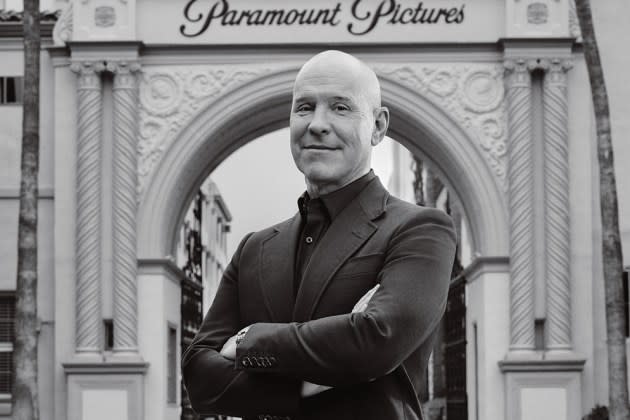
Something was amiss with Michelangelo’s waistline.
Seth Rogen and Evan Goldberg, the team behind the high school comedy “Superbad,” had sold Brian Robbins, the CEO of Paramount Pictures and Nickelodeon, on the idea of adding some adolescent anarchy into their animated reboot of “Teenage Mutant Ninja Turtles.” But there was a problem with the initial designs for the film’s four reptile heroes: Instead of looking like muscular teens, these Turtles were scrawny and malnourished, barely strong enough to wield nunchucks or hurl a throwing star. “They looked like they were on Ozempic,” Robbins jokes.
More from Variety
'Barbenheimer' Powered U.K. Box Office to $132 Million in August
'Barbenheimer' Stays Atop U.K. Box Office as 'Meg 2,' 'TMNT' Make Strong Debuts
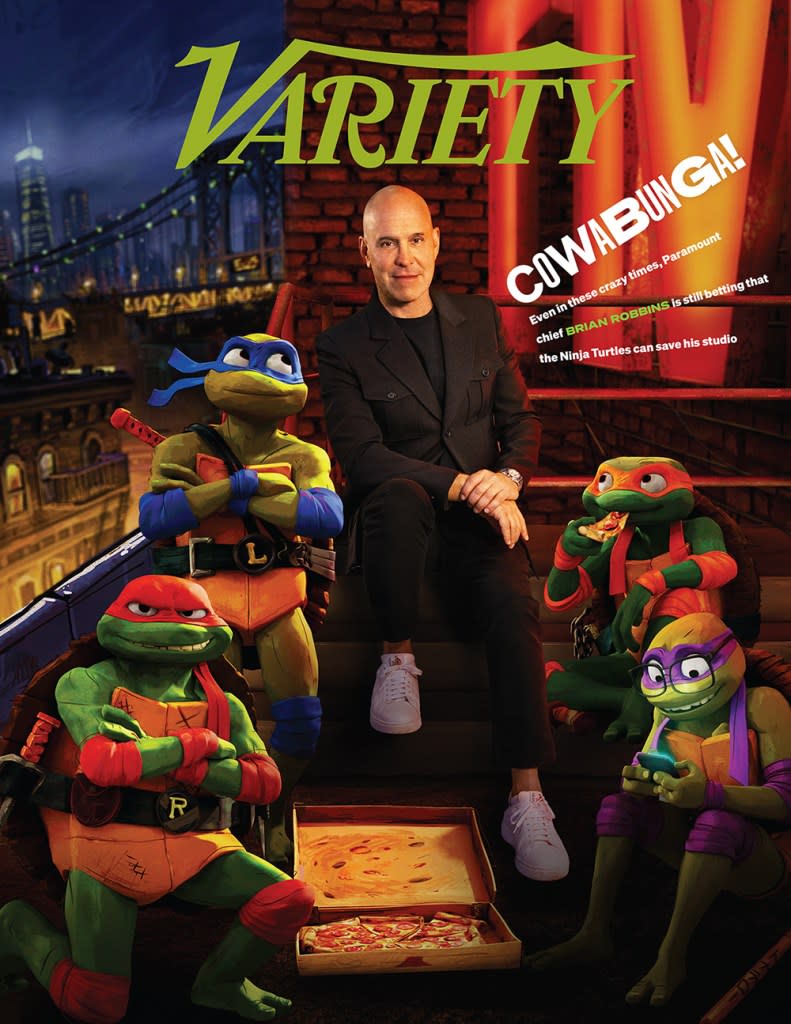
In his peripatetic career, the 59-year-old Robbins has been on every end of these kind of creative discussions, working as an actor, writer, director, producer, digital entrepreneur and now, studio chief. And that separates him from other movie moguls, who arrive at the C-suite from MBA programs and years spent in the corporate trenches.
“He’s actually made movies, which puts him in a different category from most studio executives,” says Rogen. “He has a fundamental understanding of the process. He knows how to wrangle a movie into existence. So you can have a different kind of conversation with him.”
“Teenage Mutant Ninja Turtles: Mutant Mayhem,” the result of the four-year journey to reinvigorate the tired kid’s franchise, opens in theaters on Aug. 2, and Robbins is so bullish on what Rogen and Goldberg have delivered that he’s developing a sequel. In a sign of how much the entertainment business is changing, Paramount and Nickelodeon will also produce two seasons of a streaming series with the voice cast from the movies that will serve as a “bridge” between the films.
If “Mutant Mayhem” draws crowds, it will end Paramount’s summer on a high note. But as Robbins settles into a white leather chair on the deserted set of “CBS Mornings” in July, all the momentum he’s established at the studio he’s led for two years is about to collide with a pair of labor strikes that will bring Hollywood to a standstill. There are still 48 hours to go before contract negotiations collapse between the studios and the actors union, but Robbins knows where this is heading. “They’re going to strike,” he says with an air of resignation.
And on July 14 they do, sending 150,000 actors to the picket lines alongside the 11,500 screenwriters who have been holding out since May for a contract that, among other things, gives them more generous royalties from the streaming services that license their work. The effects of this industrywide shutdown are seismic — movies and shows have stopped shooting, leaving hundreds of thousands of people without paychecks. And the delicate social fabric of the entertainment ecosystem has frayed, with each side faulting the other for letting it come to this. As a member of the directors guild, as well as a former member of the actors union, Robbins has a unique perspective on what’s going on.
“I’ve been on all sides of it,” he says. “I’m a guy who went to my mailbox and got residuals. I know how important that is to actors and writers. There has to be a way forward, and hopefully we’ll find it soon. Strikes have happened before, but this one is taking place at a difficult time.”
Outside of “Barbie,” things aren’t going so hot for the Hollywood studios who write the diminishing residual checks. The cable business is vaporizing, movies have been eclipsed by TikTok and YouTube, and streaming, which was supposed to usher in a golden era of entertainment, turned out to be too expensive to maintain. As for the box office, it’s down nearly 20% from pre-COVID levels — a sign that the filmgoing audience could be more comfortable watching movies at home. Even two of Paramount’s biggest franchises, both in their seventh installments, are showing signs of aging. “Transformers: Rise of the Beasts,” based on the popular toys, and “Mission: Impossible — Dead Reckoning Part One,” Tom Cruise’s latest outing as agent Ethan Hunt, opened below expectations this summer. They will likely not turn a profit, given their massive budgets, in their theatrical runs.
“You can’t deny that cash flow at media companies is less than it was or that their share prices are way down,” Robbins says. “There’s been major disruption in this business. We’ll get through it, but we’re going through a painful transition.” He doesn’t seem to be sweating the situation, though it helps that the heavily air-conditioned “CBS Mornings” set makes that impossible. “Why do they always keep these places so cold?” Robbins says with a theatrical shiver that betrays years spent as one of the teen stars of “Head of the Class.” Those sitcom days are long past Robbins, who is presiding over Paramount as the studio has mounted an impressive revival, one supported by hits like “Top Gun: Maverick,” “The Lost City” and “Smile.” And on the horizon are sequels to “Paw Patrol” and “Gladiator,” as well as “If” from “A Quiet Place” director and actor John Krasinski.
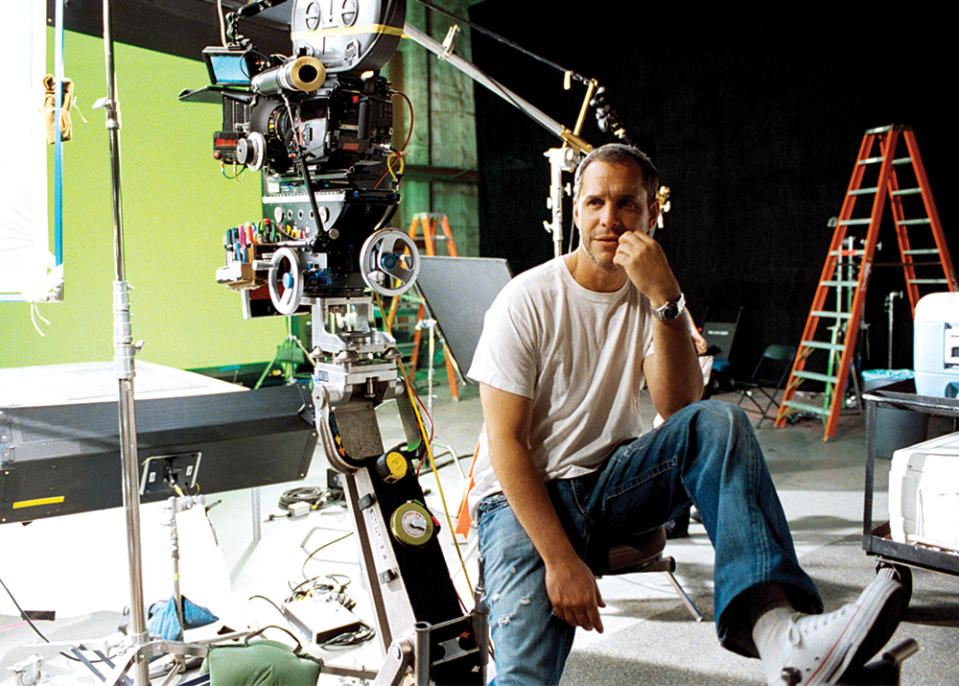
Robbins has also established strong relationships with the creative community. “As big as the stakes are, he always stays cool,” says Christopher McQuarrie, the director of “Dead Reckoning Part One.” “He’s also the only head of studio who’s ever called me just to ask how I was doing.”
It’s a shift in fortunes for a studio that had spent much of the previous decade in limbo while its parent company was engulfed in corporate melodrama featuring a merger, leadership struggles and a feud involving its owners, the Redstone family. (The revolving door of names for the conglomerate that owns the studio morphed from Viacom to Viacom-CBS to, ultimately, Paramount Global, illustrating these chaotic shifts.) Robbins politely alludes to what came before when I tell him that visiting the Paramount lot at that time was eerie — a funereal quiet hung over the place.
“Yeah, they had a great run in the early aughts, and then there was a seismic shift, and there was a lot of drama corporately at Viacom, and it just created a downward spiral,” he says.
Paramount no longer feels like it’s been left behind by the business. While Robbins may be altering the perception of the studio, the knock on him is that the most successful films that Paramount has released during his tenure originated under the regime of his predecessor, Jim Gianopulos. Robbins counters that it can take decades to develop a project, to say nothing of the work that goes into making and marketing it. “You ask who greenlit a movie?” he says. “It’s semantics. There’s a lot of people that deserve credit for ‘Top Gun: Maverick’ or ‘Mission: Impossible.’ But over the last two years, it’s been up to my team to see these movies through production and bring them into the world.”
Studio executives tend to be hard-charging, blustery sorts. And while Robbins is a workaholic with a healthy ego, he’s got a laid-back energy that separates him from the pack. He punctuates sentences with “man,” sounding more like a surfer than a suit, and has an easygoing confidence that’s disarming.
“I’ve never seen Brian nervous,” says Kenan Thompson, who worked with Robbins on his first feature, 1997’s “Good Burger.” “He always has his legs crossed, giving off this air of ‘I’ve got this all under control.’”
“This is blowing my mind,” Robbins confesses to me. “This is totally surreal.”
And as I survey the scene in front of us on a muggy June night in Brooklyn, it’s hard to disagree. After all, I’m staring directly at Pete Davidson, who’s peacocking in a blue velour tracksuit that’s been spray-painted with the face of a Transformer, traversing a line of fans screeching at him for selfies. In the distance, there’s a 15-foot statue of an Autobot, a new addition to this stretch of Flatbush Avenue. It’s all part of the extravaganza that Paramount has orchestrated to promote “Transformers: Rise of the Beasts.” But that’s not what Robbins is referring to. It turns out he grew up in Marine Park, Brooklyn, a short subway ride from here. “We went back and forth on this street all the time,” he says. “I never would have thought I’d be at something like this.”
Robbins’ family relocated to Los Angeles when he was 14 so his father, an actor, could land better jobs. Growing up, he’d run lines with his dad before auditions. Eventually, Robbins decided to try out for things himself. He secured guest spots on “Knight Rider” and “Growing Pains” and was a finalist for “Risky Business” and “War Games” before landing his breakthrough role as a rebellious prodigy on “Head of the Class.”
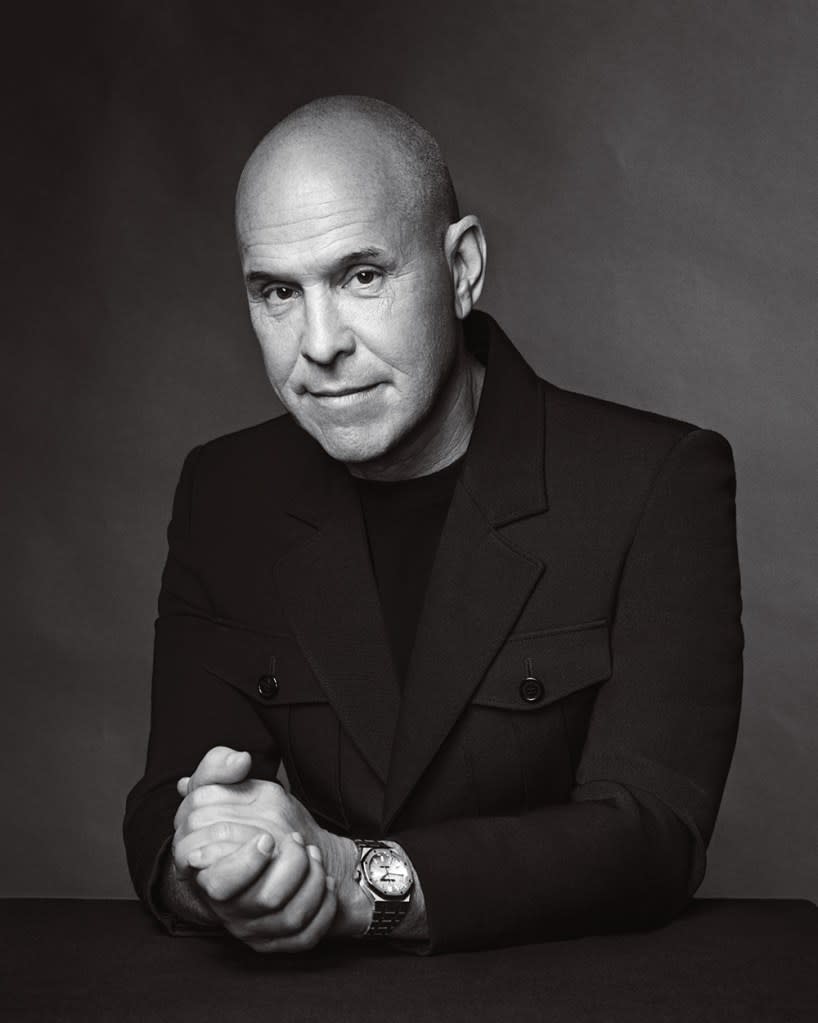
“It was amazing,” Robbins says. “I was 18 years old, and I was on one of the biggest shows on television.”
He calls the sitcom his “film school.” On set, he befriended the crew, grilling them about their jobs. “Everyone was so open,” he remembers. “They let me hang out in the writers’ room or took me to the editing room and taught me how they selected shots.”
He decided that his future lay behind, not in front of, the camera. “Acting was not my path,” Robbins says. “I didn’t want to be in my 50s auditioning for guest spots on ‘CSI.’”
After “Head of the Class” ended in 1991, Robbins began directing and producing. He made the influential 1995 music documentary “The Show,” but his real talent was his ability to sense what younger viewers wanted to watch. And in the early ’90s, those kids were looking for their own version of “Saturday Night Live,” so Robbins and his producing partner Mike Tollin created “All That,” a sketch-comedy show starring teenagers that aired on Nickelodeon. That’s where he got the idea to take two of the show’s breakout stars, Kenan Thompson and Kel Mitchell, and shoot a low-budget movie called “Good Burger” about two high school fast-food workers. Paramount executives loved the idea, and when they asked who was directing the picture, Robbins pitched himself, despite having never made a feature film.
“The second I got back to my office, I turned to my assistant and said, ‘The good news is we’re making a movie. The bad news is I have to act like I know what I’m doing,’” Robbins says.
“Good Burger” was a hit, grossing $23.7 million on its $8.5 million budget, and Robbins was in demand. He used that clout to direct a range of films, including the football drama “Varsity Blues” and a remake of “The Shaggy Dog.” Because he’d spent years acting, Robbins had a knack for identifying promising young talent and coaxing performances from them.
“Brian was the first director who spoke to me as an actor,” says Michael B. Jordan, who had one of his early roles in “Hardball,” a sports drama that Robbins directed. “He helped me tap into what a fictional character would be feeling.”
Robbins also formed bonds with actors that outlasted the movies they made together. “Brian was like a second dad,” Thompson says. “He taught me the ropes. He always told me that when you go into meetings, you can’t be your normal relaxed self: ‘Sell a version of yourself that’s more exciting.’”
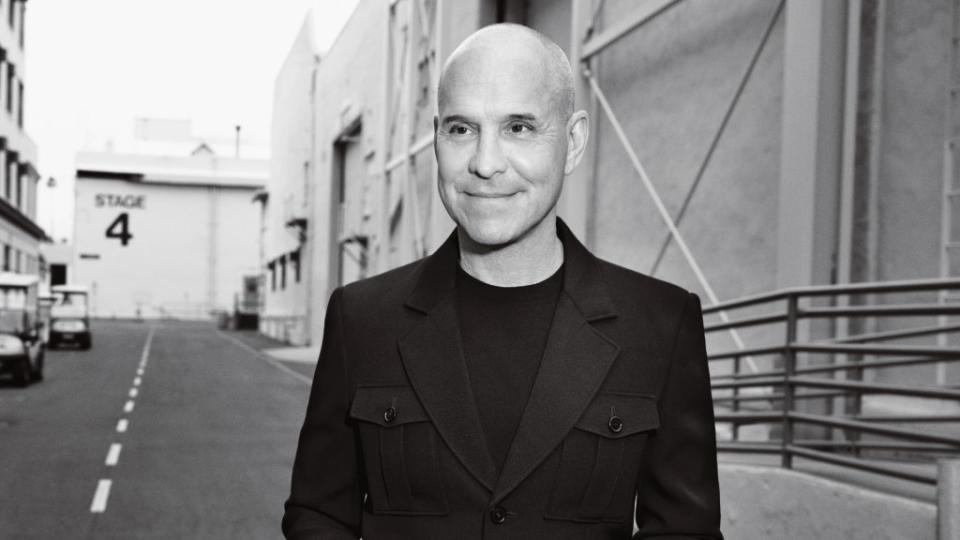
Directing proved draining, requiring Robbins to be away from his family for long stretches of time. In 2009, as he was trying to figure out his next move, he noticed that his sons were growing more engrossed by YouTube than movies or TV. One of their favorite shows focused on Fred, a hyperactive teenager played by Lucas Cruikshank, which inspired Robbins to take that character and make a movie about him. To get it off the ground, he invested $1 million of his own money, eventually signing a deal to have it premiere on Nickelodeon, where it was a ratings hit.
“It proved I could be entrepreneurial,” Robbins says. It also left him wanting to move more aggressively into the emerging medium. So he came up with the idea for AwesomenessTV, a startup targeting tween YouTube users. “He saw where the audience was going before most people did,” says UTA chief Jeremy Zimmer, Robbins’ former agent.
Awesomeness eventually sold to DreamWorks Animation, and when DreamWorks Animation was itself sold to Comcast in 2017, Robbins left the company. That’s when he was approached by Paramount to run Paramount Players, a label making mid-budget comedies and dramas. It was a short 16-month stint before he was promoted to oversee Nickelodeon, which was struggling to recapture its 1990s dominance. But an even bigger job awaited.
Paramount Global chairwoman Shari Redstone, who had urged Robbins to take the job at Nickelodeon, says she became convinced that he was the right choice to reinvigorate Paramount. She wanted the studio to have a different vision. “Brian did not have the typical résumé,” she says. “He has his own way of looking at the business. I want us to be moving and changing and looking at the future, and I feel like Brian is making sure we don’t get left behind.”
Since taking over Paramount in 2021, Robbins has pushed the film team to work more closely with other divisions of Paramount Global. “If you look at our success, we made some great movies, but we marketed the living hell out of them,” he says. “And that’s because I did what no one else at Paramount had done. There was a moat around the studio, and I pulled up the drawbridge and said we’re going to work across the company.”
So that’s why CBS viewers were treated to an appearance by “Top Gun: Maverick” star Tom Cruise on an AFC Championship Game broadcast or audiences on MTV were offered a marathon of “Scream” movies in the lead-up to the latest sequel’s release. When we meet in July at “CBS Mornings,” Robbins isn’t there to be interviewed by Gayle King. He’s observing how the program is handling “Mission: Impossible” week, which has seen cast members stop by to enthuse about making the latest installment. All that cross-promotion is supposed to help “Mission: Impossible” achieve a cultural ubiquity that’s hard to pull off in a fractured media landscape.
The release of “Dead Reckoning Part One” marks the end of a turbulent production and a crisis that Robbins inherited on his first day on the job. The studio was at an impasse with Cruise and McQuarrie about the sequel’s runaway budget, which ultimately ballooned to nearly $300 million due to COVID shutdowns, and the filmmakers’ desire to add an expensive sequence involving a Russian submarine. That scene was originally slated to appear in the next installment, but Cruise and McQuarrie believed it was necessary to include earlier in the two-part story. However, the cost had to be assumed wholly by Paramount, because Skydance Media, which co-financed the movie, had a contract requiring the studio to assume overages beyond $240 million. Robbins avoids specifics, but admits things got thorny. “Let’s just say that the studio and the production and Tom were in a disagreement over direction, and there was a stalemate going on,” Robbins says. “We had to hit the pause button. They were stuck on how they were going to move forward with ‘Dead Reckoning Part Two’ while finishing ‘Part One.’”
So, I ask, was the disagreement over money? “It was a production issue, and it was about the scope of what was being asked for,” he says. “And the question we needed to ask was do we need this and why? And then how big is it going to be, and how long is that going to take?”
Appeasing Cruise wasn’t the only thing Robbins had to worry about in those early days. He was savaged in the press, partly because he was promoted as Gianopulos, a well-respected executive who had led Paramount since 2017, was pushed out.
Because Robbins had been an early advocate of YouTube, creating AwesomenessTV to make content for the platform, many assumed that he had sold Shari Redstone on a vision of dismantling the studio’s theatrical slate and sending everything to its streaming service. But the opposite is true — “Smile,” for instance, was supposed to debut on Paramount+, but after viewing a rough cut of the film, Robbins opted to release it theatrically. In fact, he’s primarily interested in making movies for cinemas, believing that the publicity that accompanies that kind of launch makes films more popular when they hit home entertainment.
“It was understandable,” Robbins says of the criticism. “Jim is a gentleman and a statesman of the movie business. The guy is adored — I adore him. He’s nothing but a class act. We live in a world where it’s easier for the press to get more readers by writing something negative than writing something positive.”
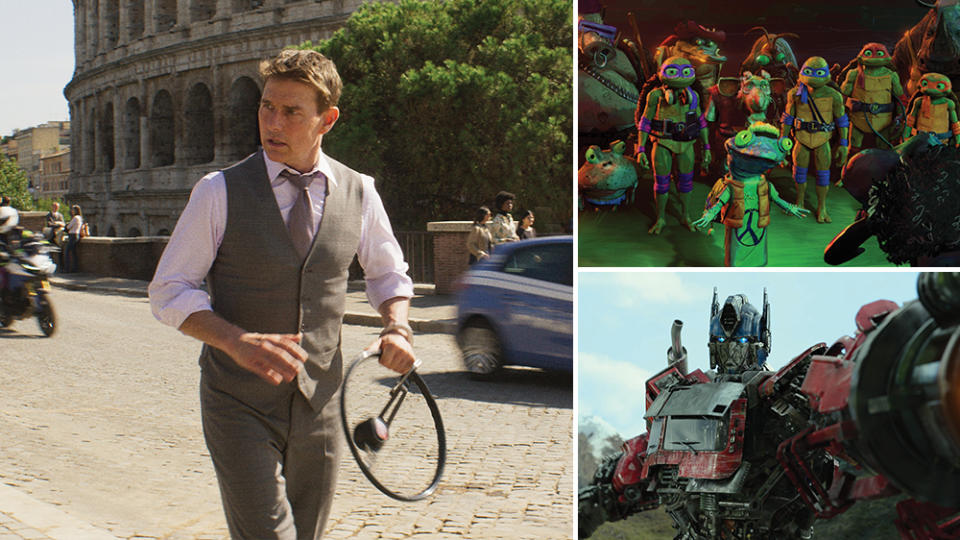
Robbins downplays that time, but friends acknowledge that the blistering coverage stung him. (TheAnkler, a newsletter that covers Hollywood, branded Robbins “Norbit Man,” a reference to the critically excoriated Eddie Murphy comedy that he directed).
“You know what I said to him,” Jeffrey Katzenberg, Robbins’ friend and mentor, remembers. “Go back and Google what happened when Barry Diller was named CEO of Paramount. Go back and look at what the reaction was when Michael Eisner was named president of Paramount. Read about when Bob Daly was first named head of Warner Bros. For all of these greats, when they got their jobs, the reaction was harsh, skeptical and cynical. It worked out pretty great for them, and it will work out great for you. Just go do the job.”
It’s a glittering summer morning, and over breakfast Robbins and three of his most trusted Paramount colleagues are giving me a guided tour of all the reasons the movie business is so hazardous. The group includes Marc Weinstock, president of global marketing and distribution, as well as Michael Ireland and Daria Cercek, the co-heads of the motion picture group. The topic is why it’s so punishingly hard to make a movie these days. “You have to will movies to happen,” Robbins says. “The biggest problem with this business is people sit back and feel like a great movie is just going to come to them.”
That passivity has made studios reliant on sequels and superhero movies, often with diminishing returns. The past few weeks have seen new installments in long-running franchises such as “Indiana Jones” and “Fast and Furious” open to disappointing results, while comic book movies like “The Flash” failed to spark much interest. “There has to be a fresh approach to making franchises,” says Cercek. Ireland, looking up from a plate of Belgian waffles, agrees. “There needs to be a reason to make a sequel,” he says. “It can’t just be we’ve made six other versions of this same story, and here’s a seventh.”
Robbins calls it having “a big idea.” And in the case of the latest “Transformers” film, that eureka moment was to have G.I. Joe enter the robots’ cinematic universe, bringing together two of Paramount’s biggest franchises. But that required Robbins to convince Hasbro, the toy company behind both sets of characters, and producers Steven Spielberg and Michael Bay, to let the studio bring the worlds together. And Bay’s approval was tricky, because he was worried that merging the series would cheapen the other “Transformers” movies. “I called him 50 times,” Robbins says. “I would not let him off the hook. And when he finally stopped dodging my calls, we got him to sign off.”
Even with G.I. Joe’s firepower, the recent “Transformers” movie grossed a mediocre $427 million. “We feel it’s not great, but good” is Robbins’ spin. But the film’s struggles, he says, show the perils of a fading global box office. Russia, once the sixth-biggest market for films, has been closed off following its invasion of Ukraine. More consequential, China, which rivals the United States in ticket sales, has become an unreliable source of revenue for Hollywood films. That’s largely due to rising geopolitical tensions with the U.S. In the case of “Rise of the Beasts,” the film grossed $90 million from China, half of what Paramount anticipated.
“China is a different marketplace,” says Weinstock. “You can’t count on it for a big number anymore, so everyone needs to reevaluate their budgets.”
Most summer movies carry staggering price tags. During COVID, many of these productions saw costs escalate by tens of millions of dollars. And though pandemic shutdowns have eased, inflation makes it hard to economize. How, I wonder, will Robbins and his team make cheaper movies?
“It’s no one’s fault,” says Robbins. “COVID and inflation took the $100 million movies and made them cost $200 million. But movie tickets didn’t go from $12 to $24. We have to ask: How do we build movies? What’s necessary? We need to make smart choices. You can’t have everything, but you need that foundation to be strong.”
Years ago, studios could build their movies around movie stars, but Hollywood has done a crappy job of replenishing its cosmos of leading men and women. Instead, they’ve leaned into comic book adaptations, where costumed heroes are the draw, not the actors behind the mask. That makes it difficult to produce other kinds of movies, such as dramas and rom-coms, that rely on personalities, not superpowers, to attract crowds.
Paramount’s leaders want to invest in a new generation of talent. They’re developing “The Saint,” a remake of the Roger Moore spy series that will star “Bridgerton’s” Regé-Jean Page. And for the “Gladiator” sequel, the studio is teaming veteran actor Denzel Washington with the 27-year-old Paul Mescal, recently Oscar nominated for his work in the indie “Aftersun.” To see if Mescal could fill out a toga, Cercek and Ireland watched his performance in the West End revival of “A Streetcar Named Desire.” “He played Stanley, and there are several moments where he takes off his shirt and it was electric,” Cercek says. “The ladies in the audience were very vocal, and we were like, ‘I think we’ve found our guy.’”
Even a star’s ability to make audiences swoon isn’t always enough to guarantee that a movie will make money. “Babylon,” an epic about the silent movie era, collapsed at the box office when Paramount released it last December, despite starring Brad Pitt, while “Dungeons & Dragons: Honor Among Thieves” will lose money even though Chris Pine led the ensemble. Robbins isn’t abandoning the idea of more “Dungeons & Dragons,” though if there’s a sequel, he says, “We’ve got to figure out a way to make it for less.” As for “Babylon,” that one hurt because Robbins believes in Damien Chazelle, the Oscar-winning “La La Land” director who made the movie. “It broke my soul to have ‘Babylon’ not do well,” Robbins admits when we meet for the first time in April. “There’s people who loved the movie and there’s people who hated the movie, but you can’t deny it’s an ambitious fucking movie.”
Costs may be rising while the box office is contracting, but Robbins sees areas of opportunity. He’s overhauled Paramount’s animation division, raiding Nickelodeon’s vault and jettisoning projects that he didn’t think were commercial. “Under the Boardwalk,” a movie about hermit crabs on the Jersey Shore that predated Robbins, will debut on Paramount+, not in theaters. “We’re not going to release an expensive original animated movie and just pray people will come,” he says.
Instead, the studio’s upcoming animated releases will center on familiar properties such as “SpongeBob SquarePants” and “Avatar: The Last Airbender,” which Robbins thinks will appeal to millennials who grew up with the shows.
“It’s not about Disney and Pixar anymore,” he says, noting that recent Disney films like “Elemental” and “Lightyear” have stumbled at the box office. “People are looking for animated movies that are irreverent and have a comedic point of view.”
Robbins and his team believe that they can successfully navigate an uncertain future for movies. But even the smartest executives or the most brilliant filmmakers and brightest stars may not be skilled enough to overcome the cultural and economic forces that are reshaping entertainment. Movies are enormous investments of time and resources, and with younger consumers growing more passionate about video games or social media, can the film business remain viable? Hollywood is already in a defensive crouch, with media conglomerates that once bragged about the billions they were shelling out for “content” now signaling they want to cut costs or sell assets. Analysts believe all this tumult could spark a fresh wave of mergers. So what would that mean for a company like Paramount Global and the studio Robbins runs?
“There’s a whole lot of uncertainty,” says Peter Newman, head of NYU Tisch School of the Arts’ MFA/MBA program. “Will more of these media companies combine? Or does someone like an Apple decide they want to take over a traditional studio?”
Back at “CBS Mornings,” Robbins looks like a man in dire need of an espresso as he rubs his eyes. He’s been out until 2 a.m., attending a lavish New York premiere for “Mission: Impossible” and then partying with the cast after the event. It must, I think, have required him to be always “on,” emanating the “exciting version” of himself that Robbins once advised Thompson to be while pitching studio executives.
Of course, Robbins is now on the other side of the desk, and that changes things. And part of his job requires saying no— rejecting a story idea or, say, informing Tom Cruise that he can’t shoot a sequence with a submarine (in the latter case, the answer was yes, because the latest “Mission: Impossible” kicks off with one).
“Delivering tough news is part of the job,” Robbins admits. “It’s about having a hard conversation. And hopefully, at the end of that talk, you still have mutual respect, or you find a way to come to a compromise. It’s not a fun part of the job.”
“Last night,” Robbins says, his mouth inching into a grin. “Last night was way more fun.”
These interviews were conducted before the SAG-AFTRA strike began.
Styling: Eric Archibald; Grooming: Sydney Sollod
Best of Variety
'House of the Dragon': Every Character and What You Need to Know About the 'Game of Thrones' Prequel
25 Groundbreaking Female Directors: From Alice Guy to Chloé Zhao
Sign up for Variety’s Newsletter. For the latest news, follow us on Facebook, Twitter, and Instagram.

